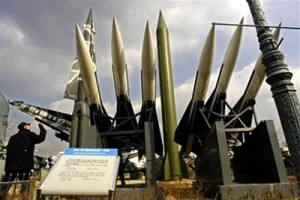
Hezbollah political bureau member Ghaleb Abu Zainab said during an interview with NBN television on Friday, that his party does not need Scud missiles to defend Lebanon.
Last week, Israeli President Shimon Peres publicly accused Syria of sending Scuds to Hezbollah. Syria has denied the charge and said Israel might be using the accusation as a pretext for a military strike.
“The Resistance possesses arms which can reach the depths of Israel,” Abu Zainab said, adding that Hezbollah is completely ready to confront Tel Aviv.
According to Abu Zainab, Washington and Tel Aviv are using their accusations of the Scud transfer to attempt to divert attention away from Israel’s violations in the Palestinian territories.
Doubts about scuds
Doubts are growing within the U.S. defense and intelligence community about allegations that long-range Scud missiles from Syria have been shipped to Hezbollah in Lebanon, U.S. officials said on Thursday.
Washington believes Syria was moving towards transferring more sophisticated Scuds to Hezbollah, but U.S. intelligence agencies have not been able to confirm Israeli allegations that the missiles have changed hands, the officials said, speaking on condition of anonymity because of the matter’s sensitivity.
While the United States suspects some kind of transfer may have occurred in Syria, two U.S. officials said there were “no indications” any Scud rockets were transported into Lebanon, which would sharply escalate the risk of a conflict.
“We don’t think Scuds of any shape or size have been moved to Lebanon,” one of the officials said.
“The Syrians aren’t always known for making the right political calculations. But in this case, surely they realize that transferring this kind of weapons system to Hezbollah — and especially to Hezbollah in Lebanon — could lead to serious consequences,” the official added.
Washington has long accused Iran of arming Hezbollah, a militant and political group that fought a war with Israel in 2006 and enjoys deep support in mainly Shi’ite south Lebanon.
In a report to Congress made public this week, the Pentagon credited Iran with helping Hezbollah build up its arsenal beyond 2006 levels, despite U.N.-backed efforts to curb weapons shipments to the group.
In addition to arms, Iran provides about $100 million to $200 million per year in funding to support Hezbollah, the Pentagon report said.
Washington fears a transfer of more sophisticated missile technology to Hezbollah would increase the likelihood of another bloody conflict between Israel and its long-time foe.
The alleged transfer from Syria involved Scuds believed to have a range of more than 435 miles (700 km), which would put Jerusalem, Tel Aviv and Israel’s nuclear reactor sites in Dimona and near Tel Aviv in range, The Wall Street Journal reported last week.
U.S. officials voiced confidence that Scuds crossing the Syrian-Lebanese border would be detected. The large rockets cannot be readily broken down into small parts for transport, the officials said. NYT, Ya Libnan

Leave a Reply
You must be logged in to post a comment.